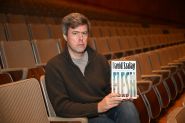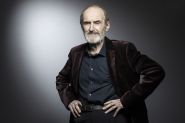
Red is the dominant color in Cyril's film, vividly representing volcanic magma, particularly after the explosion on August 4, which he began capturing through his instinctive documentary filmmaking approach. The film chronicles the experiences of Mounia Akl's film crew for Costa Brava, Lebanon, immediately following the Beirut port explosion on August 4, 2020. Dancing on the Edge of a Volcano premiered in Paris at the Lebanese Film Festival.
In Dancing on the Edge of a Volcano, red pervades the visual narrative. The red eye of DOP Joe Saade, who would possibly be filming in a blur, the red chairs in a house open to the elements, the blood of those permanently injured, and the red of revolution. Yet, this red is not unsettling, for it symbolizes the inner realities emerging from voiceovers and a camera frantically capturing remnants of survival. "Everything is open, everything is destroyed," Cyril films to preserve "the destruction, the damage, the streets of Beirut, and the completely destroyed neighborhoods where I was born and raised," he says. "My house, wounded, completely disfigured..."
Then, after the instant panic, "Where is Mounia?" After the survival instinct comes the impulse to reach out to others, and we see Mounia... She, the director, is now in front of the camera, vulnerable. Yet, she is the one who tenaciously leads her film project against all odds. Costa Brava, Lebanon. The film team is brave, facing wars and the explosion at the very heart of Beirut. Beyond resilience, bravery is a must to keep moving forward.
The director contemplates his role as part of the reconstruction. What could be the role of a filmmaker, of an artist, between "cultural resistance" and "denial"? Realizing his question mirrors that of the film crew, he decides to expand his project, linking internal destruction and reconstruction to the lived experiences of Lebanese people: "The loss of funds in banks, problems with electricity, transportation... Diving into the specifics of one story serves to narrate a larger one, that of Beirut facing its crises, rising to survive."
After the documentary segment, the laughter of twins Ceana and Geana Restom, acting in Costa Brava, shifts the viewer's perspective. Their carefree laughter, in a suspended moment in time, breathes new hope, giving the story a different meaning. Filming Costa Brava, Lebanon becomes an act of bravery. The perspective of the "audience" is forever changed. Behind their gazes lie immense losses. "Was Joe your friend?" And then again, consoling embraces of a child, but also deep-seated fears in the adventure of childhood.
Twenty-four days of production, the glances of actors crossing, fleeting filled with lifelong grief or empty desires... then as raw as they are, whole, facing the camera. There are also those who remain unseen — until the end of the film, when they toast to victory over death. What defense mechanism rules us daily? What terrifies us the most? The gaze of others or our own gaze upon ourselves? The confrontation with Beirut — or perhaps the pain? All is one. The film of Mounia Akl, that of Cyril, the actors' experiences, and the Beirut scene. "Yes, as DOP Joe Saade says, "Everything happens for a reason" in the film. Yet, what could be the reason that constantly makes us victims of an endless crisis in Lebanon?" Myriam Sassine, in a deleted scene, asserts that, given the current chaotic circumstances, August 4 was just one chapter among many...
The post-explosion phase captured by Cyril in Costa Brava, Lebanon is what moves us the most; the behind-the-scenes moments that are needed to move forward. We see Saleh Bakri, a Palestinian actor living in Haifa, detained at Beirut airport for passport reasons. We witness his respectful silence, his resilience in the name of art, and his patient, humble presence before the camera and in front of children as a journey toward humanity. Myriam Sassine, the producer, is a war journal herself. Everything lays in her — sometimes dark — humor, her -— sometimes nervous — laughter, and the daily wars accompanying Lebanese people: COVID, weather disasters, film editing and mixing to the pace of a generator, and the absurdity of being Lebanese. A team member, "foreign" to all this, asks about the name of the person "responsible" for the generator. Laughter ensues. Everything turns surreal, yet the team perseveres with daily tasks... "until windows are replaced, houses rehabilitated, and the next explosion awaited." Cyril's film is the one that unfolds in our collective unconscious, in fast-forward. "How mad men could be!"
Mounia Akl is poignant in this film. We see the woman behind the director, capturing experiences, swallowing deep emotions, continuing her work, and yet constantly questioning herself, her parents, the city, and the world. Her inquiries align with those of Cyril Aris behind his camera. Time stands still in a stolen space, away from pain and destruction, in the words of Mounia's father, Ziad Akl, urban planner and director of the urban planning institute at ALBA. He discusses with his daughter forgetfulness, a haunting specter that erases the memory of a generation constantly facing destruction. This forgetfulness pertains not to the passage of time, but to the daily brutal reality of Lebanese life and the devastatingly ordinary news of politicians. Is the only aspiration for a creative youth to leave their family nests? "This scene is inserted at the end of the film because it offers a profound conclusion through Ziad Akl’s philosophy," Cyril states. "Being constantly in a state of crisis pushes Lebanese youth to prove themselves even more. This is why they excel in all fields, especially in art, both in Lebanon and abroad, driven by a desire to create," the director continues.
In Mounia's eyes, passing by the port of Beirut, perhaps en route to the airport, we find all the answers in the world. Cyril's film is disturbing, touching, and sensitive, interspersed with scenes from Maroun Baghdadi's film, Whispers (1980), in a parallel spiral to his own, as it follows poet Nadia Tueini across post-war Lebanon. Through this cinema within cinema action, paying homage to the art of the past and present, the director traces the cyclic story of Lebanon, a country endlessly scarred by relentless questions and endless films. Documentaries intertwined with real-life fiction embed themselves in the memory of time. From the poetry of imagery and beings, everything emanates, latent or exposed, ready to explode. Facing Cyril's film, a metaphorical Dancing on the Edge of a Volcano, inspired by a sentence from Baghdadi’s scenes, we confront our internal wars and emotional volcanoes, mirroring this artistic fresco, and in turn, we dance on a volcano. Beirut, "You will ask me why I was late... and I will tell you where I was..."
Addressing Beirut, Mounia Akl says, "You will ask me why I was late... and I will tell you where I was..." And you, where do you stand in your relationship with Beirut in time and space?
It's difficult to answer this question because it was one of the main themes of the film. That's why I also included excerpts from Baghdadi's film. It's the eternal question of the Lebanese; those who left Lebanon and no longer want to hear about it, and those who, on the contrary, want to stay there at all costs... We find ourselves on this broad spectrum between these two extremes — this coexistence of love and hate. The question remains unanswered because it is part of the Lebanese identity. Finally, regarding cinema, it's tough to find funds to produce a Lebanese film without necessarily going through another country, in this case, Europe. I would say that I find myself, like many other filmmakers, quite nomadic...
Marie-Christine Tayah
Instagram:
Read more




Comments